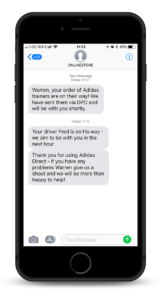Unlocking the Potential: The Power of SMS Across Industries
In today’s hyper-connected world, the Short Message Service (SMS) has evolved into a powerful tool that spans across various industries, transforming the way businesses communicate, engage with customers, and drive growth. This universal form of messaging, originally designed for simple text-based communication, has found its place as an indispensable tool in numerous sectors. Let’s explore the versatile power of SMS across several key industries, from retail to healthcare, finance, education, and beyond.
1. Retail: Reinventing Customer Engagement With SMS

Text messaging has evolved into a foundational element of contemporary retail, serving as a pivotal means through which businesses can connect with their clientele by delivering tailored offers, enticing promotions, and pertinent updates. Retail establishments strategically employ this communication channel to disseminate exclusive discount codes, keep customers well-informed about time-sensitive flash sales, and furnish vital information pertaining to order processing and delivery status. The immediacy and straightforwardness of this method of interaction play a fundamental role in shaping a shopping experience that is not only smooth but also highly effective, contributing significantly to customer satisfaction and fostering long-term loyalty.
2. Healthcare: Enhancing Patient Care By Utilising the SMS

Within the healthcare sector, text messaging has emerged as an indispensable tool for patient communication and engagement. Medical institutions and healthcare providers have embraced this communication channel to facilitate essential interactions with their patients, ensuring continuity of care and enhancing patient experiences.
One of the primary applications involves the sending of appointment reminders, helping patients stay on top of their scheduled medical visits and reducing the likelihood of missed appointments. Furthermore, text messages serve as a secure means to efficiently communicate vital test results, enabling healthcare professionals to share critical health information with patients in a timely and confidential manner.
In recent times, the advent of telehealth services has gained significant traction, revolutionizing the way patients access healthcare. These services facilitate remote consultations and follow-ups, connecting patients with healthcare professionals from the comfort of their own homes. By utilizing text messaging as a means of initiating and coordinating these telehealth interactions, the healthcare sector has expanded its reach and accessibility, ensuring that patients receive the care they need, regardless of their physical location.
3. Finance: Strengthening Security and Accessibility
Banks and financial institutions employ it for multi-factor authentication, enhancing security for online transactions. SMS alerts keep customers informed about account activity, ensuring transparency and peace of mind. Additionally, it is a channel for enabling financial inclusion by providing access to banking services for those without smartphones or internet access .
4. Education: Facilitating Learning

SMS has become an indispensable tool for educational institutions to communicate with students, parents, and faculty. Schools and universities use SMS for everything from sending important announcements and exam schedules to facilitating parent-teacher communication. It’s a cost-effective way to ensure that important information reaches all stakeholders promptly.
5. Logistics and Transportation: Streamlining Operations
The logistics and transportation industry heavily depends on text messaging to optimize and simplify its daily operations. Delivery companies, in particular, leverage this efficient communication channel to keep customers well-informed about the status of their shipments and provide estimated delivery times, ensuring transparency and customer satisfaction.
Additionally, text messaging plays a pivotal role in the management of various operational aspects within this industry. It serves as a vital tool for dispatching drivers to specific routes and locations, enabling real-time coordination and efficient allocation of resources. Moreover, logistics companies utilize text messaging to track vehicle maintenance schedules, ensuring that their fleets remain in optimal condition, which is crucial for both safety and cost-effectiveness.
Text messaging also facilitates communication among drivers and warehouse personnel, allowing for the seamless coordination of loading and unloading processes. Furthermore, it can be employed to relay urgent updates or instructions in case of unforeseen events or changes in delivery routes, helping to adapt swiftly to evolving circumstances.
In essence, text messaging has become an integral part of the logistics and transportation industry, enhancing communication, customer service, and operational efficiency throughout the entire supply chain

6. Hospitality: Elevating Guest Experiences
Hotels and restaurants leverage SMS to enhance guest experiences. From booking confirmations and check-in instructions to reservation reminders and personalized offers, it adds a touch of convenience and personalization to the hospitality sector. It’s an effective way to keep guests informed and engaged throughout their stay.
7. Government and Emergency Services: Ensuring Public Safety Via SMS Alerts

Government agencies have harnessed the potency of text messaging for emergency alerts and disseminating vital public safety announcements. This approach offers a dependable and widely accessible channel for communicating with citizens during pivotal moments of crisis, including the unprecedented challenges posed by events such as the COVID-19 outbreak and natural disasters. The expeditious transmission of essential information to the populace is paramount, and text messaging ensures the swift conveyance of crucial updates, enhancing overall preparedness and responsiveness during these exigent situations.
Conclusion
The power of SMS transcends industry boundaries, proving to be a versatile and effective tool for communication, engagement, and customer satisfaction. Its simplicity, immediacy, and widespread accessibility make it an invaluable asset for businesses and organizations across diverse sectors.
As technology continues to advance, the influence of SMS in shaping industries and improving the customer experience is only set to grow, reaffirming its status as a communication powerhouse in the modern world